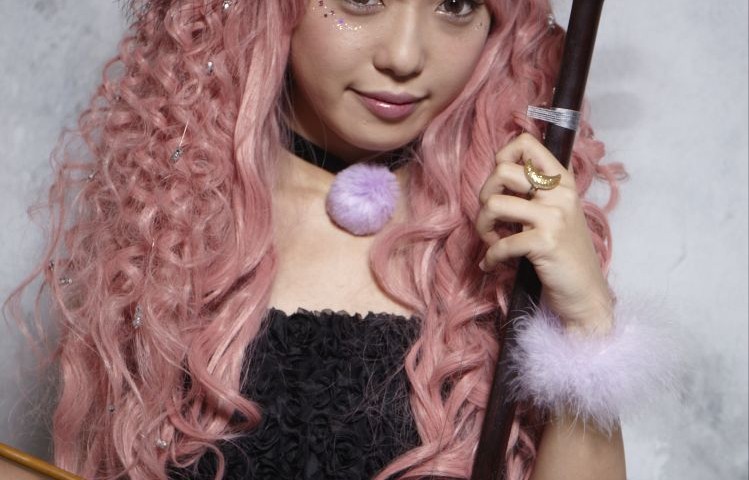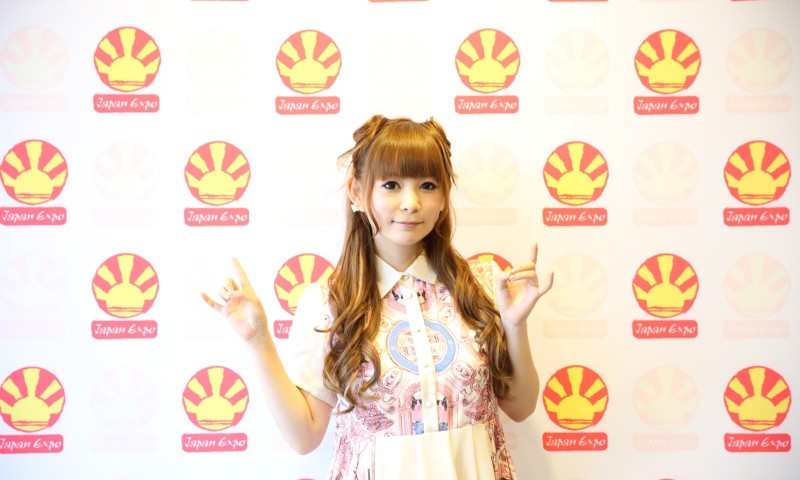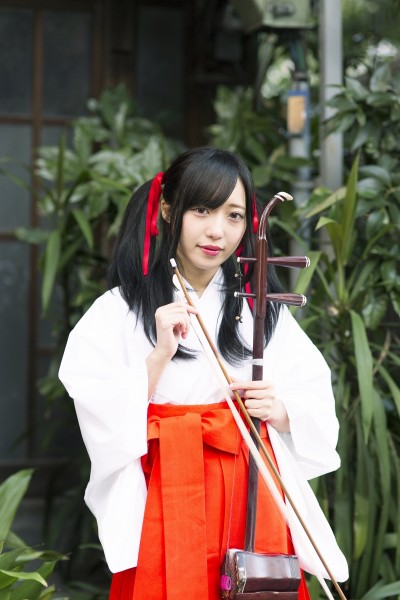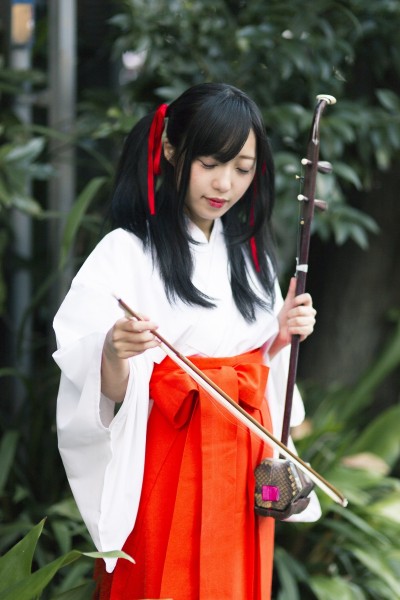
Exclusive Interview with Kiriko: Reimagining the Traditional Erhu with Anisong and Cosplay!

Not many people have heard of the instrument erhu (known as “nico” in Japanese) in Japan. Learning the erhu from the age of 6 and participating in an international music competition for the first time in 6th grade, Kiriko has received many awards both within and outside of Japan. Not only by playing classical music, Kiriko has gathered attention by creating a new style of playing anime songs by the erhu. This interview will ask her origins as an erhu player and her future activities.
日本ではあまり聞き慣れない二胡。6歳から二胡を習い始め、小学6年生で初めて国際コンクールに参加、その後も国内外で数々の賞の受賞経歴を持つ実力派二胡奏者、桐子さん。古典曲もさることながら、最近は二胡でアニソンを弾くというスタイルで一躍話題に。そのきっかけや、今後の活動についてインタビューしました。
Firstly, I recognize that erhu is an unfamiliar instrument in Japan, but how did you come to start the erhu?
−まず始めに、二胡って日本ではあまり聞きなれない楽器だと思うのですが、習い始めたきっかけは何だったのですか?
 I started when I was 6 years old. I learned the piano from 4 years old, and after 2 years of learning it, my dad became a big fan of Sakamoto Ryuichi. Sakamoto composed the theme song of the movie “Last Emperor”, and after noticing that the erhu was used in the theme song, I began to be conscious of it. Although it wasn’t a popular instrument, my dad found an erhu class and my mom started learning the erhu at a different class too, and I was watching my parents practicing the whole time. While I was watching and listening to them practicing, I began to develop relative pitch, and I was able to recognize the intervals by Do Re Mi Fa So Ra Si Do (C D E F G A B C) although I did not know the song at all. My mom used to place the score on the kitchen and hum the tune while cooking, and one day I took a look at the score when my parents were not at home. The score of the erhu is written by using the numbers 1 to 7, and when I realized that 1 is Do (C) and 2 is Re (D), I was really happy and started to be interested in playing the erhu.
I started when I was 6 years old. I learned the piano from 4 years old, and after 2 years of learning it, my dad became a big fan of Sakamoto Ryuichi. Sakamoto composed the theme song of the movie “Last Emperor”, and after noticing that the erhu was used in the theme song, I began to be conscious of it. Although it wasn’t a popular instrument, my dad found an erhu class and my mom started learning the erhu at a different class too, and I was watching my parents practicing the whole time. While I was watching and listening to them practicing, I began to develop relative pitch, and I was able to recognize the intervals by Do Re Mi Fa So Ra Si Do (C D E F G A B C) although I did not know the song at all. My mom used to place the score on the kitchen and hum the tune while cooking, and one day I took a look at the score when my parents were not at home. The score of the erhu is written by using the numbers 1 to 7, and when I realized that 1 is Do (C) and 2 is Re (D), I was really happy and started to be interested in playing the erhu.
6歳の時からです。元々4歳の時からピアノを習っていて、2年くらい習った所で父が坂本龍一さんの大ファンで。坂本さんがラスト・エンペラーのラスト・エンペラーのテーマを作曲されて、その中で二胡が使われていて、その頃から二胡を意識するようになったんです。知名度はなかったんですけど、父がたまたま二胡の教室を見つけて、その後母が別の教室で習い始めて、自分は両親が練習しているのをずっと見ていたんですけど、そんな姿を見たり聞いたりしているうちに相対音感がついていて、二人が演奏している曲は全然分からないけど、ドレミファソラシドで分かっていて。母がいつも料理しながらキッチンに楽譜を置いて鼻歌で歌って練習してたんですけど、ある日両親が居ない時にキッチンに入って楽譜をちょっと読んでみようと思ってみたら、二胡って1~7まで、って数字で表すけど、ドレミファソラシドで。それが自分でドが1でレが2で解読できたのがうれしくってそれで興味持ってやってみようかなって。
It was good that I started the erhu, but my parents were really strict and they didn’t let me play with my friends or play the game unless I practiced two hours a day. So, I used to hate the instrument that time. When I had to draw a picture of my future dream in class, I drew myself standing in the middle of an idol group. I really hated the erhu. But, I was the one who said that I wanted to start the erhu, so I continued unwillingly, and acted as if I have practiced when my parents were not at home. For example, I quickly hid my game boy and grabbed the erhu as if I was practicing, as soon as I heard the door lock open. That was how much I hated the erhu.
始めたのはいいんですけど、親が厳しくて、一日2時間とかやらないと友達と遊ばせてもらえなかったりゲームも出来なかったんです。だから私はその頃楽器が大嫌いだったんですよ。小学校で将来の夢の絵を描く授業があって、その時は3人組のアイドルの真ん中に立ってる自分を書いたりしてました(笑)。二胡大っ嫌いだったんですよ。やるって自分で言っちゃったから、怖いから、って感じで嫌々やってて、両親が居ない時は、練習した様に見せるために悪知恵を働かせていました(笑)。 カチャッと部屋の鍵の開く音がしたら、ゲームボーイを隠して椅子にすぐ着いて、二胡やってましたよ!? みたいな(笑)。本当にずるばっかしてた。それくらい嫌だったんです。
However, when I first participated and listened to the performance of the erhu players of my age at the international music competition at Beijing in 6th grade, I was astonished by the difference of the level. My result was terrible and the level was really different. Until then, I was able to easily read the music and play the instrument, and I had confidence because the people around me told me that I was good. For the children of China, being able to play accurately is something that anyone could do if they practice, and they were able to do one step further of putting their emotions in the music and being really expressive. But at that time, I didn’t know any of that and just played the notes as it says on the scores, so that’s where the difference appeared. After that, my thoughts towards the erhu changed.
でも小学六年生の時に初めて北京の国際コンクールに参加して、本場の同年代の子供達の演奏を聞いたときは、そのレベルの差に圧倒されました。結果がボロボロでもう本当にレベルが違いすぎて。それまでは普通に楽譜通りに引くことは余裕で、すごい自信があってみんなから上手に引けてるねって言われていい気になってたんです。中国の子供たちにとっては譜面のとおりに弾くっていうのは誰にでも努力すればできることで、更にその上の段階の感情の込め方、表現力がすごいあるんです。その当時私はそんなこと知らずにただ楽譜のとおりに引けばいいと思っていたから、そこに差があるのに気づいて。そこで意識が変わりましたね。
So you realized your own level for the first time in 6th grade after participating in the international music competition.
-日本にライバルがいない中、小学校6年生の時に初めて国際大会に出て、初めて自分のレベルに気づかされたということなんですね。

Absolutely. I was always being conscious of the Chinese players of my age that time. After I decided to get first place for the next contest, I practiced almost four hours every day, and I was able to win the first place in the competition held the next year at Pekin.
そうですね。その頃はずっと中国の子を意識してました。ぜったい次のコンクールでは優勝するって決めて、そこからは毎日4時間くらい練習をして、無事一年後の北京でのコンクールで1位を取りました。
The video of you playing the song of the anime “Love Live” has received attention not only in Japan but in other countries such as China and Shang hai. Why did you think of playing anime songs with the erhu? (The video : http://www.nicovideo.jp/watch/sm23473412)
−二胡でアニメ「ラブライブ!」の曲を弾いている動画が、日本だけでなく中国、香港など海外でも話題になっていましたね。二胡でアニソンを弾いてみようと思ったきっかけは何ですか?(動画:http://www.nicovideo.jp/watch/sm23473412)
I liked playing games and watching animes since I was little. During my study abroad in Pekin, I always played classical songs, but the music I usually listen to are songs of Nogizaka 46, or anime songs, or other idol songs. I used to be an otaku, but I didn’t have any otaku friends around me, so I was hiding it the whole time. I made a secret account on twitter and tweeted things like “Harutan (^ω^) peropero”. But one time I made a mistake and tweeted about the anime Love Live on my main account. I was depressed because I thought my followers would decrease, but surprisingly, it increased. It was that time when I thought that these kinds of people can become my fan. Since then, I started posting videos on Nikoniko Douga, and there was more response than I had expected, and nanka omoshiroina tte omoihajimeta.
小さい頃からゲームやアニメが大好きなんです。北京留学中はずっと古典曲ばかりやってたけど、普段聞くのは乃木坂46とかアニソンとかアイドル系の曲ばっかり聞いてて。つまりいわゆるオタクなんですけど、周りにオタク友達がいなかったから、ずっと隠してたんです。Twitterなんかも裏アカウント作って「はるたん(^ω^)ペロペロ」とか書いてたんです(笑)。でもとあるきっかけで間違えて本アカでアニメ「ラブライブ!」のことをつぶやいてしまって! フォロワー減るなって落ち込んでたら逆に増えたんです(笑)。そのとき、こういう人たちにファンになってもらえるかも、と思って。それからニコニコ動画とかをやるようになって。配信してみたら予想以上に反響があって、なんか面白いな、って思いはじめました。
In the event held on July at Hong Kong, you performed the song of “Love Live”. How was the reaction of the audience?
−今年7月に香港で開催された同人イベントでも、「ラブライブ!」の曲を演奏されていましたね。観客の方の反応はいかがでしたか?
I was worried that people would respond negatively if I played anime songs with such a traditional musical instrument, so I was surprised and glad at the same time when the audience was pleased with my performance. Also, when I arrived to the airport, the fan was waiting for me and they took me to the live hall. Many people came to my signing and photo taking sessions, and the CDs were sold out too. I thought I was not popular at all, so I was very happy and grateful.
二胡っていう伝統的な民族楽器でアニソンを演奏するなんて、どうなんだろう、邪道だとか言われないかな、って心配もしたんですけど、逆に喜んでもらえてびっくりしたし、やっぱりすごく嬉しかったです。しかも空港に着いたらファンの方が会場までアテンドもしてくださったんですよ! サイン会と写真撮影会もやったんですけどたくさんの方が来てくださって、CDも持っていた分が全部売り切れて。自分がまったくの無名だと思って行ったので、本当にありがたいです。
As an erhu player, what are your future goals and things you want to challenge?
−二胡奏者としてのこれからの目標や、チャレンジしてみたいを聞かせて下さい。
My primary goal is to become synonym with erhu. I want my name “Kiriko” to appear on the top when people search the keyword “erhu”. It may be difficult to be the number one player just by looking at the technical aspects, but I want to try my best for people to know the erhu by playing anime songs. Also, although the erhu is known as “the tone of healing”, I want to teach them that that is not it. After going abroad and listening to the genuine erhu, I realized that China also plays technical music with the erhu too. I think that kind of music is more of a mesmerizing style than healing music. It is important to be conservative to sustain the traditional erhu, but I thought I can express the beauty of erhu by doing something different.
一番の目標は、二胡奏者と言えば桐子、と言われるようになること。二胡ってキーワードいれて検索すると一番に出てくる、ってくらい。技術面で1番になるというのは大変なことかもしれないけれど、アニソンを弾くとかちょっと変わったことをして、もっともっとたくさんの人に二胡を知ってもらうために頑張りたい。あと二胡って日本では“癒しの音色”とか言われることが多いんですけど、それだけではないってことも伝えたいですね。留学をして本場の二胡を見て聞いてきて、超絶技巧的な曲を弾くのが中国でははやっていたりするのを知って。それって癒しというよりは魅せるスタイルだと思うんですよね。二胡っていう古典的な楽器を守るために、保守的でいることも大切なことだけれど、自分が少し変わったことをして若い人に二胡の魅力を伝えていくことで、何か変えられることがあるんじゃないかな、と思っています!
The album “NiKOHOLiC” is now on sale! With the album, she challenges to play pop music and anime songs not only traditional music, to show new style of expression of Chinese traditional instrument erfu. You have to listen to the original song “Cat Tail” that was composed for this album! Why don’t you listen to the Kiko World filled with a world view of originality?
そんな桐子さんですが、最新アルバム「NiKOHOLiC」が絶賛発売中! 伝統音楽の垣根を越え、ポップスやアニメソングなどにも挑戦し、中国伝統楽器・ニ胡の新たな表現として注目の作品。このアルバムのために書き下ろしたオリジナル曲「きゃっとている」も必聴! 独特の世界観あふれる桐子ワールドを、二胡になじみがある人もない人にもぜひ聞いてみて欲しい。
BUY ITEM

NiKOHOLiC

